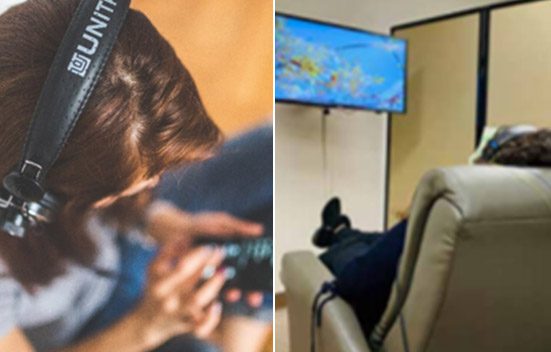🧠 Have you heard of the new player on the anxiety battlefield?
Neurofeedback for Anxiety: Rewiring Your Brain for Calm and better functioning!
In a world that’s increasingly on edge, everyone’s looking for ways to dial down the anxiety. You’ve tried everything from meditation apps to breathing exercises—and let’s not forget the impromptu breakdowns in the shower. But there’s a new player on the anxiety, and higher brain function battlefield that’s bringing some serious brainpower to the fight: Neurofeedback. Yep, we’re talking about tech-savvy brain training that promises to help you self-regulate your emotions, reduce anxiety, and chill out on a whole new level. Let’s break it down.
🎧 What is Neurofeedback? A Quick 101
Imagine you’re playing a video game—except the controller is Your brain. Neurofeedback is a type of biofeedback that helps you train your brain to change its activity patterns. Here’s the cool part: it’s all done in real time. You’re hooked up to an EEG, short for an electroencephalogram, which measures your brainwaves, and your brain gets immediate feedback on its dysfunctional brainwaves to self-regulate!
The goal? To help your brain learn what “calm” feels like and to stay in that zone longer your brain needs to eliminate the brainwaves that are “out of range” also called dysfunctional brainwaves. Neurofeedback brings more awareness to your brain for your brain to self-regulate and function at a higher, more effective, and more successful level.
You know how practicing guitar eventually makes you better at it? This is like that but for your brain’s anxiety response. 🎸🧠.
💆♂️📉 How does it work?
Picture this: You’re sitting in a comfy armchair with sensors on your scalp, watching a screen. Your brainwaves are on display and followed micro-second by micro-second. Every time your brainwaves are going “out of range, range scientifically pre-established, your brain receives a signal to self-regulate. This is bringing more awareness to your brain for your brain to naturally self-correct every time your brain drifts into less ideal patterns (like stress, anxiety, dreaminess…), It’s the brain’s way of learning what works best for it, and over time, it gets better at functioning at an optimal level without the help of the tech.
This Month Get Your Personalized Brain Map Assessment at No Cost: 760.633.3328 Here
🧘♀️ Neurofeedback vs. Traditional Treatments: What’s the Difference?
So how does neurofeedback stack up against more traditional methods like therapy, medication, or even yoga classes that end with a quiet namaste? Here’s a quick breakdown:
🚫 No meds, no side effects
Unlike meds, neurofeedback doesn’t come with side effects like drowsiness, weight gain, or that zombie-like feeling. For those who are tired of popping pills to manage anxiety, this could be a game-changer. It’s about teaching your brain to manage anxiety on its own—kinda like potty training, but less messy.
🧑⚕️ Complementary to therapy
If you’re already seeing a therapist, neurofeedback can enhance your progress. Think of it as giving your brain a workout between therapy sessions. Your therapist helps you understand why you’re anxious, and neurofeedback helps retrain your brain’s response to that anxiety to naturally eliminate these dysfunctional brainwaves.
🎯 Highly personalized
Since everyone’s brain is different, neurofeedback is customized to your unique brain patterns. It’s not a one-size-fits-all approach, which makes it a powerful tool for tackling specific triggers and personal anxiety profiles.
💡 The Science Behind It: Why It Works
Okay, you’re probably thinking: “This sounds great, but where’s the proof?” It turns out, there’s a decent amount of research backing neurofeedback’s effectiveness, especially for anxiety and mood disorders. Multiple studies have shown that people who undergo neurofeedback training often report feeling less anxious, more in control of their emotions, and better equipped to handle stress.
🧠 Brainwaves Explained
Our brains operate on different frequencies, and each frequency corresponds to a different state of mind. For instance, beta waves are linked to alertness, concentration, and sometimes—yep, you guessed it—stress. Alpha waves, on the other hand, are tied to calmness and relaxation.
Neurofeedback helps your brain shift from high-stress beta waves to more calming alpha waves. Over time, your brain starts to remember how to access those more relaxed states on its own, without needing an assist from external tech.
🧑🔬 The Research
A study published in the journal NeuroRegulation found that neurofeedback could significantly reduce anxiety in individuals with generalized anxiety disorder (GAD). The participants in this study showed improvements in emotional regulation and a significant drop in anxiety symptoms after a series of sessions. Other research shows neurofeedback’s potential for helping with PTSD, ADHD, and even depression.
📅 What to Expect from a Neurofeedback Session
If you’re curious about trying neurofeedback, here’s what a typical session might look like:
- Assessment: You’ll start with a brainwave analysis to identify where your brain could use some help. Think of it like getting a mental fitness assessment.
- Session Time: You sit in front of a screen with sensors placed on your scalp. As you watch a movie or listen to music, the feedback system responds to your brainwaves. And note this, these signals correspond to your own dysfunctional brain waves!
- Consistency is Key: Sessions usually last about 35-45 minutes, and multiple sessions (think 20-40) are needed for long-lasting results. Neurofeedback is like going to the gym for your brain—you need to show up regularly for it to work. 💪🧠
This Month Get Your Personalized Brain Map Assessment at No Cost: 760.633.3328 Here
🎯 Is Neurofeedback Right for You?
Neurofeedback isn’t a magic bullet, but it’s a promising option for those looking to manage anxiety without medications or as a complement to traditional therapies. If you’re dealing with chronic anxiety, panic attacks, or stress that feels unmanageable, this might be worth considering—especially if you’re curious about trying something outside the pillbox.
The Takeaway
Neurofeedback is a non-invasive, drug-free, and scientifically backed method to help reduce anxiety by retraining your brain’s response to stress. The commitment level is high (those 20-40 sessions aren’t going to schedule themselves), but the potential payoff—a calmer, more balanced brain—might just be worth the investment. “It’s the best investment I’ve ever made for myself,” says Katherine F.
🏁 Wrapping Up
Neurofeedback offers a new, tech-savvy way to calm the mind. Whether you’re a biohacker or someone simply fed up with anxiety, this innovative brain-training method has the potential to shift the way we think (literally!) about managing stress. If your usual anxiety remedies aren’t cutting it anymore, it might be time to give your brain a nudge in the right direction.
🔑 Key Takeaways:
- Neurofeedback is a personalized brain-training technique using real-time brainwave feedback.
- It’s drug-free, non-invasive, and has minimal to no side effects.
- Science backs it: Studies show neurofeedback can significantly reduce anxiety and improve emotional regulation.
- Expect multiple sessions for lasting results, similar to building physical muscle at the gym—but for your brain.
- This Month Get Your Personalized Brain Map Assessment at No Cost: 760.633.3328 Click Here
Join the hundreds who have found relief with our cutting-edge neurofeedback solutions. Discover why we’re San Diego’s premier choice for effective, natural approaches to mental wellness. With over 55 years of trusted experience, we create personalized programs tailored to your unique needs and lifestyle recommendations.





